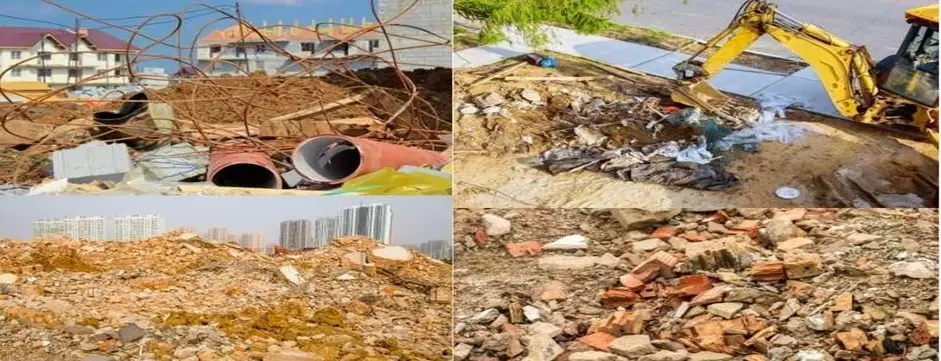Home » Infrastructure Urban Projects waste management and recycling of materials
Developing an infrastructure urban project that focuses on waste management and recycling of materials is not only essential for environmental sustainability but also for improving the overall quality of life in urban areas. Here’s a step-by-step guide on how to plan and execute such a project:

Needs Assessment and Research:
Begin by conducting a comprehensive needs assessment. Identify the current waste management system, recycling rates, and areas with the highest waste generation.
Research best practices and technologies in waste management and recycling that are suitable for your urban area.
Set Objectives and Goals:
Define clear objectives and goals for your project. These may include increasing recycling rates, reducing landfill waste, or improving overall waste collection efficiency.
Stakeholder Engagement:
Engage with all relevant stakeholders, including government agencies, local businesses, community organizations, and residents. Gather input and support for the project.
Regulatory Compliance:
Ensure that your project complies with all local and national waste management regulations and standards.
Budget and Funding:
Develop a budget that includes costs for infrastructure, equipment, personnel, and ongoing operations.
Seek funding sources, which may include government grants, private investors, or public-private partnerships.
Infrastructure Planning:
Design the waste management infrastructure, including collection points, recycling facilities, and waste processing centers.
Consider the latest technologies for efficient waste sorting and recycling.
Collection and Transportation:
Implement an organized waste collection and transportation system, including separate bins for recyclables and regular waste.
Consider using GPS technology to optimize collection routes.
Recycling Facilities:
Establish recycling facilities equipped to process and sort various types of recyclable materials such as paper, plastics, glass, and metals.
Ensure that these facilities meet environmental and safety standards.
Awareness and Education:
Launch public awareness campaigns to educate residents and businesses about the importance of waste reduction, recycling, and proper disposal.
Monitoring and Evaluation:
Implement a system for tracking waste generation, recycling rates, and overall project performance.
Regularly evaluate the project’s success and make necessary adjustments.
Incentives and Rewards:
Introduce incentives or rewards programs to encourage residents and businesses to recycle and reduce waste.
Waste-to-Energy:
Explore the possibility of converting non-recyclable waste into energy through waste-to-energy (WTE) facilities.
Research and Development:
Invest in ongoing research and development to discover new recycling technologies and improve the efficiency of waste management.
Continuous Improvement:
Continuously engage with stakeholders and the community for feedback and improvement suggestions.
Stay updated with emerging trends and technologies in waste management and recycling.
Scaling and Expansion:
Once the initial project is successful, consider scaling it up to cover a larger area or replicating it in other urban regions.
Sustainability and Environmental Impact:
Ensure that your project has a positive environmental impact and contributes to sustainability goals.
Public-Private Partnerships:
Collaborate with private companies for waste collection and recycling services, as they often have expertise and resources to contribute.
Data Management:
Implement a robust data management system to track waste generation, recycling rates, and other key metrics.
Remember that waste management and recycling projects require long-term commitment and ongoing maintenance. Public support and education are critical for the success of such initiatives.
Regards
Dr. Konica Sharma
School of basic & applied Science
October 6, 2023RECENT POSTS
CATEGORIES
TAGS
Agriculture Agriculture future AI Architecture artificial intelligence BA English BA Psychology BTech CSE BTech Engineering Business management career Career-Specific Education career guide Career Opportunities career option career scope Civil engineering commerce and management Computer Science Computer science engineering Data science degree education Engineering Engineering students English Literature english program Exam tips Fashion Design Fashion design course Higher Education Journalism journalism and mass communication law Law career Machine Learning MA Psychology Master degree mathematics MBA Mechanical Engineering Pharmacy Psychology Research and Development students
University Address: Nachauli, Jasana Road, Faridabad, Haryana
Toll Free: 1800-120-4613
Mobile : 8447744303 | 8447744304 | 8447744306 | 8447744309
Address: C-72, Second Floor, Shivalik, Near Malviya Nagar,
Above HDFC Bank, New Delhi 110017
Ph.No. - 011-46570515 / 45138169 / 41755703 / +91-7303152412
Jagmani Kutir, Ground Floor, Road No-1, Rajeev Nagar,
Near Darbar Marriage Hall, Patna-800024, Bihar
Contact No: 9818352069/8130120095
Mail: [email protected]
Copyrights © 1998 - 2025 Lingaya's Vidyapeeth (Deemed To Be University). All rights reserved.
It is important to note that the following email IDs and domains are fraudulent and do not belong to our university.
LV only conducts physical/online verification of any document related to examination on the following email id: